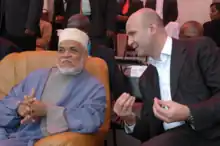 | |
| Comoro Gulf Holdings (CGH) | |
| Type | Privately held company |
| Industry |
|
| Founded | 2006 |
| Founder | Mohammed Al-Otaibi |
Key people | Bachar Kiwan Majd Suleiman Sheikh Sabah Jaber Mubarak Al-Sabah Mohammed Al-Otaibi |
| Website | www.comorogulfholding.com |
Comoro Gulf Holdings (CGH), sometimes referred to as Comoros Gulf Holding or Comoro Gulf Holding, was an investment company, set up by Syrian businessmen Bachar Kiwan and Majd Suleiman and Kuwaiti businessmen Sheikh Sabah Jaber Mubarak Al-Sabah and Mohammed Abdulaziz Al-Otaibi, that had worked closely with former Comorian president Ahmed Abdallah Mohamed Sambi, and "monopolized investment and development on the islands."[1][2][3][4]
Activities
2008 Comoros Economic Citizenship Program

In 2006 Bachar Kiwan, the founder of Comoro Gulf Holding (CGH) began to lobby the Comoros legislature to enact a controversial citizenship by investment scheme in which his close associate, Comoros ex-President Ahmed Abdallah Sambi would have discretion to grant citizenships.[5] Promises of an investment of more than $100 million on behalf of wealthy Gulf investors were made by Comoro Gulf Holdings (CGH), to sell the legislation to Comoran lawmakers. In 2008, Said Attoumani, the former Comoran minister responsible for promoting foreign investment, praised the expected $100 million from wealthy Gulf investors in support of the prospective law.[5][6] In a Comoran parliament debate in July 2008, the parliament rejected the proposed economic citizenship law, claiming that it would be equivalent to auctioning off Comorian nationality.[3]

The new law was passed in November 2008 after a number of "fact-finding" missions by Comoran politicians to Kuwait and the UAE organized by Comoro Gulf Holdings partners Bachar Kiwan, Majd Suleiman, Sheikh Sabah Jaber Mubarak Al-Sabah, and Mohammed Al-Otaibi[5][3] in October,[3] in which "deputies received laptops and other gifts."[7] After passage of the law, the former secretary-general of the Comoros parliament, Aboubacar Said Salim, was hired by Comoro Gulf Holdings (CGH).[8][7]
In a 2009 leaked diplomatic cable, US diplomatic officials in Comoros asked their colleagues in the Gulf for more information on Bachar Kiwan, whose company, Comoro Gulf Holdings (CGH) "actively and openly lobbied for a controversial 'economic citizenship law' that appeared to be rejected, then was passed at the National Assembly."[5][7]
The US cable added:
"Taken at face value, CGH is a limited-funding promoter with a long-term vision of the Comoros as a Gulf tourist destination. Given years of stagnant economic growth, it is unsurprising that President Sambi's government would welcome these investors. Even the active promotion to force through the economic citizenship law could be viewed in terms of investment promotion and assurances. Still, something does not add up and it is worth investigating whether CGH's growing influence in the Comoros is completely benign."[7]
In April 2015, a Comorian court ruled that Comoro Gulf Holdings owed the state $16 million from the economic citizenship program. In May 2015, the Comorian state ordered the seizure of company assets on the island.[3]
Ties to ex-president Ahmed Abdallah Sambi
Ahmed Abdallah Sambi worked closely with Comoro Gulf Holdings (CGH) during his presidency (2006–2011), during which the company monopolized investment and development in Comoros, controlling major portions of the media, banking, tourism, travel and construction industries.[2][1] In 2007, Sambi appointed Kiwan to the post of Honorary Consul of Comoros for Kuwait.[9]
After the 2008 invasion of Anjouan that deposed former President of Anjouan Colonel Mohamed Bacar, posters of Sambi proclaiming that he was the "father of national unity" appeared all over the country, with the Comoro Gulf Holdings logo in the corner. Comoro Gulf Holdings' newspaper, Al-Balad, mostly reprinted pro-Sambi articles and promoted Comoro Gulf Holdings activities. During the fuel shortages that followed the invasion, CGH's bank on the island, Banque Féderale de Commerce, reportedly made $3–5 million in revolving credit available for petroleum imports.[7]
Affiliated businesses
- Banque Féderale de Commerce
- Comoro Gulf Aviation[10]
- Comoros United Company for Publishing and Distributing
- Royal Itsandra Hotel[11]
- United Group (UG)
- Al-Balad
See also
References
- 1 2 Lori, Noora (2019). Offshore citizens : permanent temporary status in the Gulf. Cambridge. p. 220. ISBN 978-1-108-63256-0. OCLC 1119537788.
{{cite book}}: CS1 maint: location missing publisher (link) - 1 2 Beaugrand, Claire (2018). Stateless in the Gulf : migration, nationality and society in Kuwait. London. ISBN 978-1-78672-323-9. OCLC 1021174080.
{{cite book}}: CS1 maint: location missing publisher (link) - 1 2 3 4 5 Abrahamian, Atossa Araxia (11 November 2015). "The bizarre scheme to transform a remote island into the new Dubai". The Guardian.
- ↑ "COMOROS ISLANDS : Comoro Gulf Holding - 13/03/2010 - The Indian Ocean Newsletter". Africa Intelligence. 13 March 2010. Retrieved 22 November 2023.
- 1 2 3 4 Salisbury, Peter (19 November 2015). "Inside the $100 Million Scheme to Send the Middle East's Most Unwanted People to Africa". VICE News.
- ↑ "Citizenship for sale". Africa Intelligence. 10 July 2008.
- 1 2 3 4 5 "Gulf Investment Group Influence in the Comoros" (PDF). 5 January 2009.
{{cite journal}}: Cite journal requires|journal=(help) - ↑ "Aboubacar Said Salim". Africa Intelligence. 12 December 2008.
- ↑ Lori, Noora (2019). Offshore citizens : permanent temporary status in the Gulf. Cambridge. p. 221. ISBN 978-1-108-63256-0. OCLC 1119537788.
{{cite book}}: CS1 maint: location missing publisher (link) - ↑ "Kiwan - M. Bachar | ICIJ Offshore Leaks Database". offshoreleaks.icij.org. Retrieved 29 December 2021.
- ↑ "Ernst & Young: Doing business in Comoros" (PDF). August 2009.
